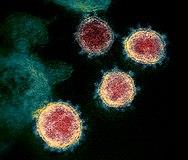


Joseph R. Anticaglia MD
Medical Advisory Board
On Friday, May 5th of this year, WHO declared COVID-19 is no longer a global health emergency. On Saturday, the day after the announcement, Dennis, a 68 year old retired dentist, tested positive for COVID. Dennis had read the headlines about COVID-19: Nursing Homes — No Mask Requirements; the U. S. Department of Health and Human Services declare an end of the COVID-19 as a public health emergency.
He thought , “If it’s OK to visit a sick relative, or a friend in a nursing home without a mask, I should be OK to go shopping and do other chores without a mask.” That all changed Saturday morning.
Around 2:30 a. m., Dennis awoke with a runny, stuffy nose and couldn’t get back to sleep. Over the next several hours the runny nose got worse, he complained of a sore throat, felt fatigued, developed a mild headache and neck ache. Seven hours later, he tested positive after taking the COVID-19 Home Antigen Test. He called his primary care physician who prescribed Paxlovid (nirmatrelvir — ritonavir) to be taken for five days. After the last dose of Paxlovid, he tested negative for COVID. Dennis wondered, “What have we learned about COVID-19?

1) COVID is Persistent: COVID and its deadly cousins are not going away. We remain vulnerable to this disease. In March 2023 the CDC reported thousands of new cases of GOVID-19 in its weekly report.
2) Public Health: COVID-19 highlighted the critical role of public health in safeguarding communities. It demonstrated how scientific research, vaccination programs coupled with public health safety precautions and disease surveillance saved millions of lives. However, COVID also demonstrated how the public health system in this country was less than stellar in its initial response to the 2020 COVID pandemic.
3) Global Connection: A virus isn’t confined to one part of the world, or to one country. The pandemic demonstrated how viruses can spread rapidly across borders. It emphasized the need for nations to work together to share information and to tackle the next global health crisis cooperatively.
4) Adaptability: The pandemic force people, communities, schools and businesses to adjust to a new reality. We learned the importance of resiliency, flexibility and creativity in transitioning from in person experiences to remote schooling, to remote work, and adjusting to safety protocols. We also learned about inequalities.
5) Inequalities: The pandemic displayed the vulnerabilities and inequities that exist in society. When schools were forced to closed, students with no access to remote learning fell behind in their studies. The pandemic called attention to the disparities in health care. For instance, the use of telemedicine, or remote healthcare, proved to be effective. At this time, many physicians’ offices ask patients if they prefer a virtual, or in-person office visit. These inequality gaps, and others, need to be addressed to help individuals reach their full potential.
6) Science and Research: Scientists and researchers taught us that rapid research is possible. They taught us the value of evidence-based decision making. They demonstrated the rapid development of vaccines used to prevent COVID and showcased medications, such as Paxlovid to treat this virus.
Their work help initiate safety protocols to combat SARS-CoV-2, the virus that causes COVID-19. The scientists also reenforced the notion of transparency and cooperation, the idea that medical discoveries should be shared to benefit the global community
7) Social Connections: The pandemic reminded us of the value of human connections, relationships and community support. Friends and neighbors were calling each other asking how they felt, or if they could “pick up something” for them from the pharmacy, or the grocery store?
8) Mental Health: The pandemic brought about the fear of infection, financial stress and anxiety about the future. Lockdowns, quarantines and social distancing created a sense of isolation and loneliness. The lack of in-person social interactions inside and outside of the workplace deepened the sense of loneliness and contributed to depression for many people. The disruption of accessing mental health facilities during the height of the pandemic caused more feelings of isolation, grief and sadness.
9) Forgotten Heroes: The contributions of hospital workers during the COVID pandemic have been lauded and rightly so. But there are workers who haven’t received such praise. These individuals make up an Army of essential workers who keep our society functioning smoothly.
Countless individuals volunteered their time and energy to support those in need. These volunteers ran errands for the elderly and high risk individuals, assisted with food distribution, and provided emotional support through helplines.
People working in caregiving professions and social workers provided essential support to vulnerable populations such as the elderly, people with disabilities, and those with mental health challenges.
With school closings, teachers transitioned to remote learning and adapted their teaching methods to virtual platforms. They often worked overtime to provide their students with the support they needed academically and emotionally.
In addition to healthcare professionals, society needs this army of essential workers to function well. Delivery drivers, pharmacists to fill your prescriptions, supermarket workers to “check you out,” sanitation workers, firemen, policemen, transportation workers, warehouse workers to fill your online orders and many more.
10) Long COVID The final chapter of the multiorgan, long-term effects of COVID-19 has yet to be written.
11) Preparedness: COVID-19 taught us that better preparedness, swift response to infectious diseases, stock piling of essential supplies, improved digital literacy, better communication and management could have saved thousands of lives. Hopefully, we’ll be prepared for the next viral onslaught.
This article is intended solely as a learning experience. Please consult your physician for diagnostic and treatment options.